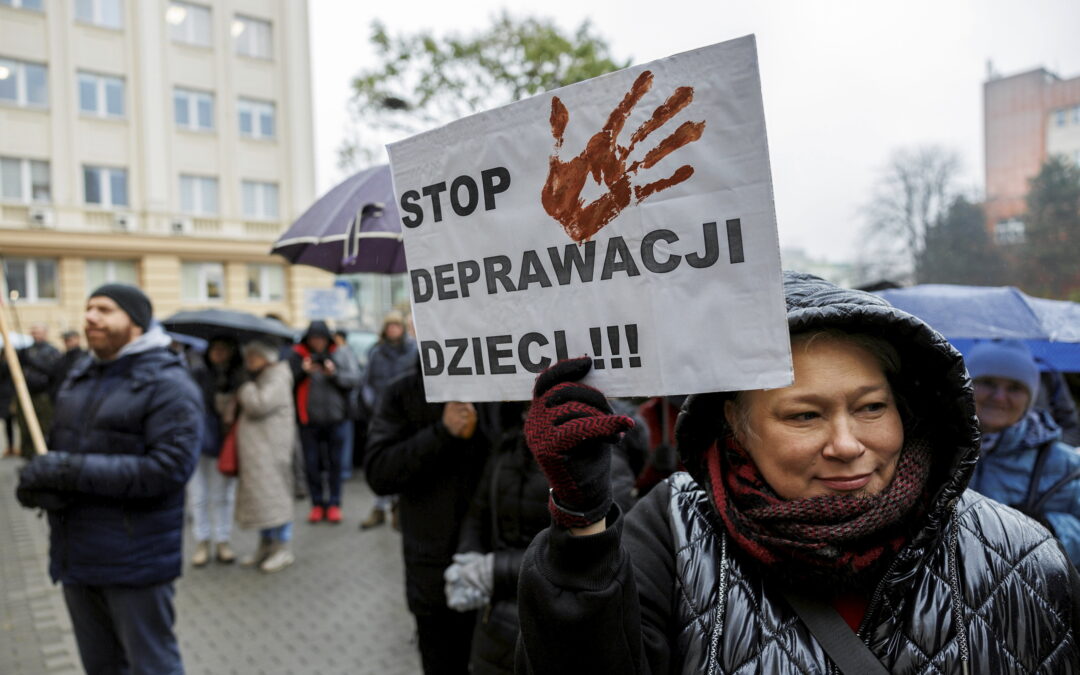Keep our news free from ads and paywalls by making a donation to support our work!

Notes from Poland is run by a small editorial team and is published by an independent, non-profit foundation that is funded through donations from our readers. We cannot do what we do without your support.
A split has emerged in Poland’s government after a deputy prime minister, who hails from the most conservative part of the ruling coalition, declared that the planned new school subject of health education would be optional for pupils.
That prompted criticism by the education minister, from the more liberal wing of the ruling camp, who said that she wants the subject to be compulsory and that no decision has yet been made.
Meanwhile, recent days have seen protests in a number of Polish cities organised by conservative groups who warn that the new subject is a way to smuggle sex education – which is currently optional – into schools and that it will “morally corrupt” children.
Figures associated with Poland's conservative opposition – including their presidential candidate – joined a protest against government plans to introduce more sex education in schools.
They say it will promote "depravity" and "sexualisation" of children https://t.co/d5SECfvark
— Notes from Poland 🇵🇱 (@notesfrompoland) December 2, 2024
Last year, the education ministry announced that health education would replace so-called education for family life (WDŻ) classes as part of a new school curriculum.
The creation of the new subject has been coordinated between the education, health and sports ministries. Initially, the plan envisioned health education beginning at the start of the next school year, in September 2025, and being a mandatory class for pupils of all ages.
But the proposal quickly drew criticism from conservatives due to the inclusion in the draft curriculum of elements relating to sex education, such as “autosexual behaviour” and “the concept of psychosexual orientation (heterosexual, homosexual, bisexual, asexual)…[and] gender identity, cisgender, transgender”.
Last weekend, protests took place in the cities of Kraków, Szczecin and Radom under the title “Yes to education! No to depravity!”.
At the Kraków demonstration, Barbara Nowak, a politician from the opposition Law and Justice (PiS) party and former provincial education superintendent, told the Polish Press Agency (PAP) that the government is “consistently implementing a plan to morally corrupt Polish children…[by] pushing [them] towards fast sexual initiation in detachment from love, from the principles of Christian civilisation”.
In response to the protests, Władysław Kosiniak-Kamysz, who serves as a deputy prime minister and the defence minister, said that he wanted “to reassure all those who protested: the subject will be optional, it will be the parents’ decision; I think it will be devoid of any ideology – right or left wing”.
Kosiniak-Kamysz is the leader of the Polish People’s Party (PSL), an agrarian, centre-right group that is the most conservative element in the ruling coalition, which also encompasses centrist and left-wing parties.
Edukacja zdrowotna w szkołach będzie przedmiotem nieobowiązkowym, o udziale w nim będą decydować rodzice, powiedział wicepremier i minister obrony narodowej, lider PSL, Władysław Kosiniak-Kamysz. pic.twitter.com/n7DOcdc2HH
— Radio ZET NEWS (@RadioZET_NEWS) January 12, 2025
His remarks prompted pushback from education minister Barbara Nowacka, who is leader of the liberal Polish Initiative (Inicjatywa Polska), one of the parties that makes up Civic Coalition (KO), the largest group in the ruling coalition.
“Someone has mistaken the defence ministry with the education ministry once again,” wrote Nowacka on X. One of her deputy ministers, Paulina Piechna-Więckiewicz, added that “for the record, education is not a department within the defence ministry”.
Last week, in an interview with broadcaster Radio Zet, Nowacka confirmed that, while she “believes that the subject of health education should be compulsory, we are considering various scenarios. Various discussions are going on, but there is no decision yet”.
In response to this weekend’s controversy, another deputy prime minister, Krzysztof Gawkowski, who comes from The Left (Lewica), told broadcaster Polsat that he also believes health education should be compulsory and he thinks Nowacka is “pursuing a good policy”.
Ktos znów pomylił MON z MEN jak czytam 😳
— Barbara Nowacka (@barbaraanowacka) January 12, 2025
The clash is the latest in a series of disputes between the more socially liberal and conservative sections of the ruling coalition.
Last year, Prime Minister Donald Tusk admitted that it may be impossible to implement the government’s promise to end Poland’s near-total abortion ban because of differences within the coalition about how far the law should be liberalised.
Progress in introducing same-sex civil partnerships has also been delayed amid opposition from PSL, while last week the party joined with the opposition to vote down a bill tabled by one of its partners that would have introduced tougher new requirements for hunters.
Parliament has rejected a proposal for hunters to undergo regular physical and mental health checks in order to keep their gun licences
The bill split the ruling coalition, with the centre-right PSL joining the conservative opposition in voting against it https://t.co/ljXprhO1yn
— Notes from Poland 🇵🇱 (@notesfrompoland) January 11, 2025

Notes from Poland is run by a small editorial team and published by an independent, non-profit foundation that is funded through donations from our readers. We cannot do what we do without your support.
Main image credit: Patryk Ogorzalek / Agencja Wyborcza.pl

Agata Pyka is a former assistant editor at Notes from Poland. She specialises in Central and Eastern European affairs, cybersecurity, and investigative reporting. She holds a master’s degree in political communication from the University of Amsterdam, and her work has appeared in Euractiv, the Balkan Investigative Reporting Network (BIRN), and The European Correspondent, among others.



















